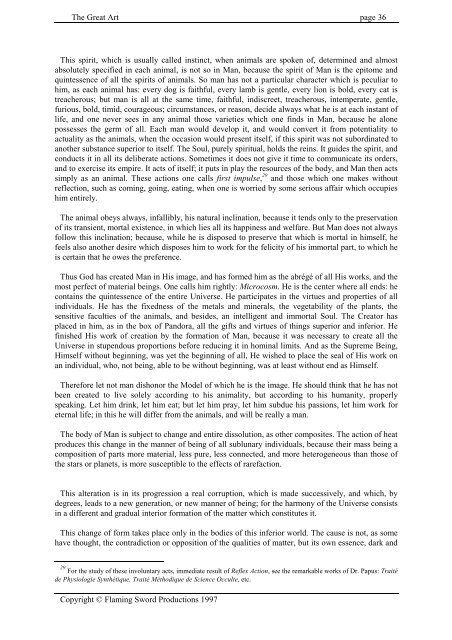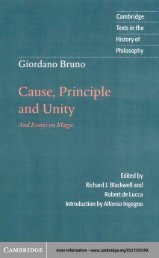The Great Art
Create successful ePaper yourself
Turn your PDF publications into a flip-book with our unique Google optimized e-Paper software.
<strong>The</strong> <strong>Great</strong> <strong>Art</strong> page 36<br />
This spirit, which is usually called instinct, when animals are spoken of, determined and almost<br />
absolutely specified in each animal, is not so in Man, because the spirit of Man is the epitome and<br />
quintessence of all the spirits of animals. So man has not a particular character which is peculiar to<br />
him, as each animal has: every dog is faithful, every lamb is gentle, every lion is bold, every cat is<br />
treacherous; but man is all at the same time, faithful, indiscreet, treacherous, intemperate, gentle,<br />
furious, bold, timid, courageous; circumstances, or reason, decide always what he is at each instant of<br />
life, and one never sees in any animal those varieties which one finds in Man, because he alone<br />
possesses the germ of all. Each man would develop it, and would convert it from potentiality to<br />
actuality as the animals, when the occasion would present itself, if this spirit was not subordinated to<br />
another substance superior to itself. <strong>The</strong> Soul, purely spiritual, holds the reins. It guides the spirit, and<br />
conducts it in all its deliberate actions. Sometimes it does not give it time to communicate its orders,<br />
and to exercise its empire. It acts of itself; it puts in play the resources of the body, and Man then acts<br />
simply as an animal. <strong>The</strong>se actions one calls first impulse, 29 and those which one makes without<br />
reflection, such as coming, going, eating, when one is worried by some serious affair which occupies<br />
him entirely.<br />
<strong>The</strong> animal obeys always, infallibly, his natural inclination, because it tends only to the preservation<br />
of its transient, mortal existence, in which lies all its happiness and welfare. But Man does not always<br />
follow this inclination; because, while he is disposed to preserve that which is mortal in himself, he<br />
feels also another desire which disposes him to work for the felicity of his immortal part, to which he<br />
is certain that he owes the preference.<br />
Thus God has created Man in His image, and has formed him as the abrégé of all His works, and the<br />
most perfect of material beings. One calls him rightly: Microcosm. He is the center where all ends: he<br />
contains the quintessence of the entire Universe. He participates in the virtues and properties of all<br />
individuals. He has the fixedness of the metals and minerals, the vegetability of the plants, the<br />
sensitive faculties of the animals, and besides, an intelligent and immortal Soul. <strong>The</strong> Creator has<br />
placed in him, as in the box of Pandora, all the gifts and virtues of things superior and inferior. He<br />
finished His work of creation by the formation of Man, because it was necessary to create all the<br />
Universe in stupendous proportions before reducing it in hominal limits. And as the Supreme Being,<br />
Himself without beginning, was yet the beginning of all, He wished to place the seal of His work on<br />
an individual, who, not being, able to be without beginning, was at least without end as Himself.<br />
<strong>The</strong>refore let not man dishonor the Model of which he is the image. He should think that he has not<br />
been created to live solely according to his animality, but according to his humanity, properly<br />
speaking. Let him drink, let him eat; but let him pray, let him subdue his passions, let him work for<br />
eternal life; in this he will differ from the animals, and will be really a man.<br />
<strong>The</strong> body of Man is subject to change and entire dissolution, as other composites. <strong>The</strong> action of heat<br />
produces this change in the manner of being of all sublunary individuals, because their mass being a<br />
composition of parts more material, less pure, less connected, and more heterogeneous than those of<br />
the stars or planets, is more susceptible to the effects of rarefaction.<br />
This alteration is in its progression a real corruption, which is made successively, and which, by<br />
degrees, leads to a new generation, or new manner of being; for the harmony of the Universe consists<br />
in a different and gradual interior formation of the matter which constitutes it.<br />
This change of form takes place only in the bodies of this inferior world. <strong>The</strong> cause is not, as some<br />
have thought, the contradiction or opposition of the qualities of matter, but its own essence, dark and<br />
29 For the study of these involuntary acts, immediate result of Reflex Action, see the remarkable works of Dr. Papus: Traité<br />
de Physiologie Synthétique, Traité Méthodique de Science Occulte, etc.<br />
Copyright © Flaming Sword Productions 1997

















